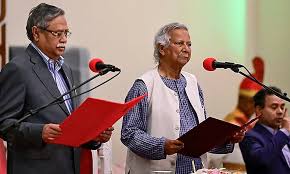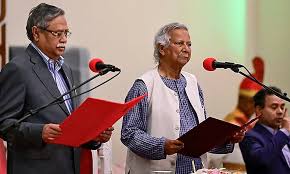
A Pivotal Moment in Bangladesh’s Political Landscape
Bangladesh is at a critical juncture as interim Prime Minister Muhammad Yunus has threatened to resign if political parties fail to reach a consensus on essential reforms. Yunus, a Nobel Peace Prize laureate, assumed leadership in August 2024 following a student-led uprising that ousted then-Prime Minister Sheikh Hasina. His administration was tasked with steering the country towards democratic stability and holding free and fair elections. However, the lack of cooperation among political factions and mounting public pressure have led Yunus to reconsider his position.
Stalled Reforms and Growing Discontent
Since taking office, Yunus has emphasized the need for comprehensive reforms to address systemic issues within Bangladesh’s political framework. Despite the establishment of the Constitutional Reform Commission and the proposed creation of a National Constitutional Council, progress has been slow. Critics argue that the interim government’s focus on reforms has delayed the much-needed national elections, leading to widespread dissatisfaction among political parties and the public. The Bangladesh Nationalist Party (BNP) and other opposition groups have expressed concerns over the prolonged interim period and the absence of a clear electoral roadmap.
Tensions with the Military and International Observations
Compounding the political crisis are reports of escalating tensions between Yunus and the military. Sources suggest that the military’s increasing involvement in governance matters has created a power struggle within the interim administration. This development raises concerns about the potential erosion of democratic institutions and the resurgence of authoritarian practices. International watchdogs, including Human Rights Watch and the United Nations, have also criticized the interim government’s handling of civil liberties, particularly in the aftermath of the 2024 protests. The OHCHR report highlighted excessive use of force against demonstrators, leading to calls for accountability and respect for human rights.
The Possibility of Yunus’s Resignation
Amidst these challenges, Yunus has reportedly questioned the feasibility of continuing in his role without the support of political parties. His advisers have indicated that Yunus is prepared to step down if the impasse persists. Such a move would not only create a leadership vacuum but also deepen the political crisis, potentially leading to further instability. The interim government’s inability to facilitate dialogue and implement reforms has eroded public trust, with many questioning the administration’s commitment to democratic principles.
The Path Forward: Dialogue and Reform
The situation in Bangladesh underscores the importance of inclusive dialogue and genuine reform efforts. For the country to navigate this crisis successfully, all political parties must engage constructively with the interim government to chart a clear path towards elections and democratic consolidation. The international community also has a role to play in supporting Bangladesh’s transition by encouraging dialogue, providing technical assistance for electoral processes, and monitoring human rights developments.
Conclusion: A Nation at Crossroads
Bangladesh stands at a crossroads. The decisions made in the coming weeks will determine the nation’s trajectory towards democracy or potential backslide into authoritarianism. The threat of Yunus’s resignation serves as a stark reminder of the challenges facing the interim government and the urgent need for political consensus. As the situation unfolds, the eyes of the world remain on Bangladesh, hopeful that its leaders will prioritize the nation’s democratic future over partisan interests.









































Leave a Reply